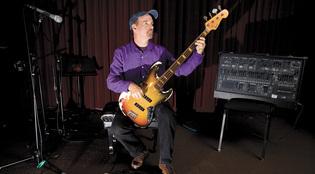 loading
loading
Arts & CultureMan on bassChristopher Arnott is a freelance arts journalist in New Haven.  Julie BrownJack Vees, director of the music school's Center for Studies in Music Technology, also plays bass and composes music. View full imageA couple of years ago, Jack Vees set to work on an experimental film with Fran Apprich, a German artist in residence at the Yale medical school. Apprich saves footage from brain scans and other medical films, including glowing, explosive images that appear to be neurons firing. Vees’s musical accompaniment for these mind-blowing visuals was just as otherworldly: the eerie sound of a singer’s voice resonating through a piano. Not the voice itself, but the sound that remains when you record a singer and an unplayed piano in the same room, then remove the vocal track. “The microphone is deep in the piano,” explains Vees, director of the Center for Studies in Music Technology at the Yale School of Music. “The singer sings the pitch, it records, the actual singing is trimmed off, and I keep the resonance.” Vees’s work resonates well beyond the cluster of rooms in the basement of Sprague Hall where he teaches, records, prepares Internet broadcasts for the music school, and makes music. As a performer, he’s an electric bass player who appears in jazz clubs and who wrote the book on bass harmonics. (It’s called The Book on Bass Harmonics.) As a composer, he writes instrumental pieces and the occasional opera. And as a teacher, he has a mission to familiarize music students with the rudiments of studio recording. The class he teaches in Popular Music and Studio Technique every other year, he says, “helps students learn how technology is changing the way they make their art. Some of them become producers, some are now working in film or television, others just become conversant in the possibilities.” Vees’s own recordings and live performances aren’t showy or technically or emptily theoretical. They’re warm, vivid, carefully paced, and dedicated to showing the richness of his chosen instrument, which is not known for its solo or melodic capabilities. He describes his battered-bass reimagining of Willie Dixon’s blues standard “Spoonful” (retitled “SPNFL”) as a tribute to the well-known rendition of the song by Eric Clapton’s band Cream, “one of the best improvisations in rock I’ve ever heard.” Vees sampled it, in his trademark resonant manner, “so I could play along with my reminiscences.” Vees’s works connect with both student and faculty performers. Wen Yang ’09MusM chose Vees’s “Table of Content” for her student recital last year, requiring her to play classical stand-up bass accompanied by four differently tuned electric basses. The piece attracted the attention of Vees’s School of Music colleague, jazz bassist Willie Ruff, for whom Vees is now adapting it. “The way Willie heard it, it was like a jazz chart he could play over.” The Vees opera oeuvre includes Feynman, about the popular physicist, which has been performed at both the Norfolk Chamber Music Festival and the Knitting Factory, a club in New York City. His next opera will be about Branch Davidian religious sect leader David Koresh. The backbone of a revolutionary and influential Yale music scene, Jack Vees hadn’t expected to be in New Haven more than two or three years when he first came to the School of Music from CalArts in 1986. He was prized then for his experience in electronic music, but he also felt an immediate kinship with the composers and performers here. James Velvet, an elder statesman of the New Haven music scene who cohosts the long-running Local Bands radio show on WPLR, says, “Jack is a musician of many talents and interests. But I’ve jammed with him, and he’s recorded with some of my rock-and-roll cohorts, and in my opinion what Jack likes to do most, deep down in his soul, is rock.”
The comment period has expired.
|
|